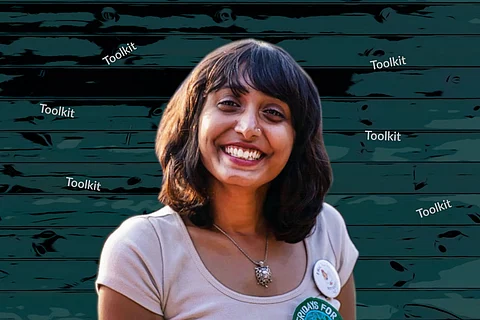

The term ‘toolkit’ has in recent days been splashed across social media platforms and news channels, with the word taking on sinister connotations - likened to a weapon to wage war against India. All this after climate activist Greta Thunberg shared a toolkit in connection with the farmers’ protest in New Delhi. Greta’s tweet in the first week of February set off a chain of events, resulting in the arrest of Bengaluru-based Disha Ravi, who purportedly edited and shared the toolkit for coordinated protests against the Union Government’s farm laws.
But what is a ‘toolkit’? TNM takes a closer look at this tool that is commonly used by political parties, NGOs, celebrity managers and others for social media mobilisation and campaigning. Incidentally, a Delhi court has since called the toolkit shared by Disha 'innocuous’ and while granting her bail observed that the crime of sedition, for which she was booked, has not been made out.
A toolkit, in its simplest form, usually means a generic document with basic information on any issue, tweet suggestions, hashtags and whom to tag on social media. It is used by political parties, celebrity campaign managers, corporate publicists for structured and sustained campaigns albeit in different forms and with different names.
Speaking to TNM, a social media campaigner, who has been managing the social media accounts of several senior leaders of the BJP, admitted that the national party’s IT cell also sends details for coordination for Twitter storms regularly. The details could be anything, ranging from what events senior leaders of the party are attending to what issue to push for mileage, what terminologies to use and even what personalities to target or attack. The source said that though it is known as a ‘briefing document’ in the BJP, it entails similar instructions that the Greta ‘toolkit’ had detailed, including hashtags, time, frequencies and total duration of the campaign.
While BJP leaders have been berating Greta Thunberg, Disha Ravi and others for a coordinated campaign, in the past several of its party leaders, including its IT cell head Amit Malaviya, have inadvertently shared documents with intricate details of social media campaigns and Twitter storms. Several such slip-ups have given an insight into how the exact same words or similarly phrased tweets have been seen for many years from BJP leaders, ministers and even celebrities including sports persons and film personalities.
Opposition parties have been calling out the BJP for its attack on celebrities and activists who have been supporting the farmers’ protests. Speaking to TNM, Srivatsa YB, the National Campaign in-charge for Youth Congress alleged that the BJP is deliberately distorting what a toolkit is to distract attention from protests.
“This Greta 'toolkit' controversy is BJP making a mountain out of a molehill. An editable, shared Google document is common in any social media campaign. All political parties, NGOs, and even celebrities use these toolkits so that people participating in the campaign have information and a sense of direction. A Google document about the farmers’ protests has been demonised,” he said, “BJP is clutching at straws trying to gain back the narrative and are concocting this silly conspiracy out of thin air. Parties use such toolkits as a Google doc or even just a WhatsApp message with a Google drive link to share information which is then pushed to party workers and used in digital campaigns.”
Members of BJP’s ally in Tamil Nadu, the AIADMK also acknowledged the use of similar methods to organise campaigns. The AIADMK IT wing Secretary Singai Ramachandran said that they do not create Google documents but usually send messages with hashtags and issues, schemes to focus on. Speaking to TNM, he said, “Most of our traction is organic but we do send across details of what programs the government or the party is launching. For example, if we were to engage in a social media campaign for Amma’s (Jayalalithaa) birth anniversary, we send out details of the good work she has done, what schemes our cadre can talk about and maybe a few images. The rest is customised by the individual member.”
The use of such documents is not limited to political parties. A source who works in the entertainment industry spoke to TNM about how toolkits for film promos have been in existence since 2015. "There are WhatsApp groups for film promos where film trackers and social media influencers are present. When a film has to be promoted, the hashtags to be used and the tweets to be plugged on social media platforms are given by the agency that the producer is using for marketing. The time when the hashtags and tweets need to go up is also specified. We're told in advance which promos will be coming out and we start giving a build-up to the release to create a buzz.”
The source pointed out that many big budget films use this strategy but smaller films are also doing it these days. “For example, 'Kayal' Anandhi's upcoming release Kamali was trending recently. If it is a popular star like Sivakarthikeyan, the trend gets pushed easily by fans and others. Some people just copy-paste the tweets as given but others write their own tweets based on the content."
Activists working on issues across the spectrum have been known to use documents or social media platforms to catalogue and formulate their drives. Arun Javagal, a pro-Kannada activist currently managing the social media cell of Karnataka Rakshana Vedike said, “We are not very organised like the BJP yet, our activists still don't know how to tweet. So we start with teaching them how to tweet. We create images and circulate on WhatsApp since we are in a nascent state but those who do this on a large scale, use documents. We use videos and images and circulate it in our groups. But there is nothing wrong in documenting it, that is how it can reach all our activists.”